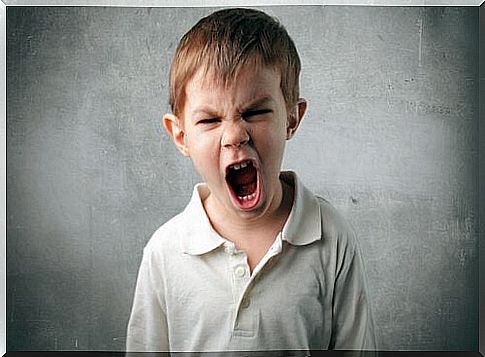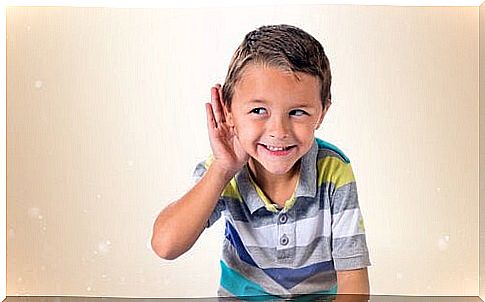Seven Strategies To Teach Children Impulse Control

Many behavioral problems in children are the result of a lack of impulse control. However, learning to control your impulses is no easy task. This is because the prefrontal cortex in small children is not yet fully developed. And this is precisely the part of the brain associated with this task.
However, it is not always easy for adults either; so why should it be easy for children? Impulse control requires several skills that you should actually teach a child as soon as possible. It’s all about control, a skill that children can gradually develop, even from their first social interactions.
Aggressive commercials that are virtually everywhere and try to encourage people of all ages to consume more and more makes it even more difficult to teach children to control their impulses. When push comes to shove, we are used to handing out instant rewards and as adults, we also enjoy receiving instant rewards. In fact, all those stimuli around us prompt us to make hasty and thoughtless choices, simply because in return we want to receive something that we will immediately enjoy. However, this pleasure is also short-lived.
Impulse control and success in school
While success in school doesn’t necessarily guarantee success in the future, it can open up all kinds of opportunities. Moreover, it can also make the relationship between parent and child more positive. In general, it is very conducive to family life.

In this regard, impulse control can help a child overcome important stress-causing demands (such as homework, tests, etc.), learn to wait their turn, learn to listen, and learn to think first and then to act.
Impulse control can also help a child with the relationships he has with his peers. And sometimes even with the relationships he has with his teachers and other adults he comes into contact with.
In addition, impulse control can help a child manage his time better, especially when it comes to school tasks. In fact, according to neuroscientists Sandra Aamodt and Sam Wang, self-control is twice as important as intelligence when it comes to academic achievement.
It’s worth noting that children who can control their impulses generally tend to think about their answers before writing them down and are better able to think critically to find solutions to problems . In addition, these children can tolerate more frustration when solving problems.
Strategies to help children control their impulses
Fortunately, impulse control can be transmitted and learned. It’s not even an innate ability at all. It is quite possible to teach children from an early age to control their impulses, without suppressing these impulses. You can do this in a very conscious and healthy way. Let’s take a look at some strategies that can help you get this done.
Learning to recognize feelings
Only when a child is able to distinguish between his feelings and his behavior can he learn to control his impulses. For example, it is important that a child understands that it is normal to get angry about something, but that it is not okay to hit others or break things. Understanding this, children see that they have several options for facing their feelings without resorting to violence.
Developing listening skills
Sometimes children act impulsively because they have not listened properly. This causes them to act before they even listened to everything they had to pay attention to. It is essential to teach children to listen to and follow instructions carefully and even to ask them if they can repeat what you have just said to them. Make sure they have fully understood everything.

Learning to maintain and control anger
Little tolerance for frustration creates a lot of behavioral problems. That is why it is important to teach children how to maintain and control their anger. That way they will be able to calm down on their own when they get upset. By teaching a child strategies such as stepping back or taking a short break before continuing, a child will feel that he is able to calm himself again.
Adopt appropriate behavior
Children will learn much more about impulse control from what they see than from what they are told. Therefore, do not only give a good example of appropriate behavior, but also explain how you manage to control your impulses at times when you are faced with a problem. It is even better if you explain this with an example that your child has already experienced or if you relate it to a situation that he is currently experiencing.
Other strategies
Finally, we share a few more tips to help children control their impulses:
- Children must learn to solve their problems on their own. Children should be able to point out their problems themselves. They should be able to weigh their options and make choices logically and thoughtfully. A child who is able to analyze a problem and think about his options will not act impulsively.

- Establish clear rules that allow a child to know what is expected of them. A child who knows what to do will be better able to control his impulses, especially when he has to make a choice. Even better when he knows very well the consequences of not following the rules.
- Encourage your child to be physically active. For children who are physically very active, it is easier to control their impulses. Light physical activity, preferably outdoors if possible, is very helpful. Competitive games and sports are great activities to teach children self-control. Competition is very healthy, as long as it is conducted in a controlled and supervised manner. These kinds of games and sports should be conducted under the supervision of a professional who can ensure that there is no violence. These people will encourage the children to solve problems themselves and get along well with each other.









